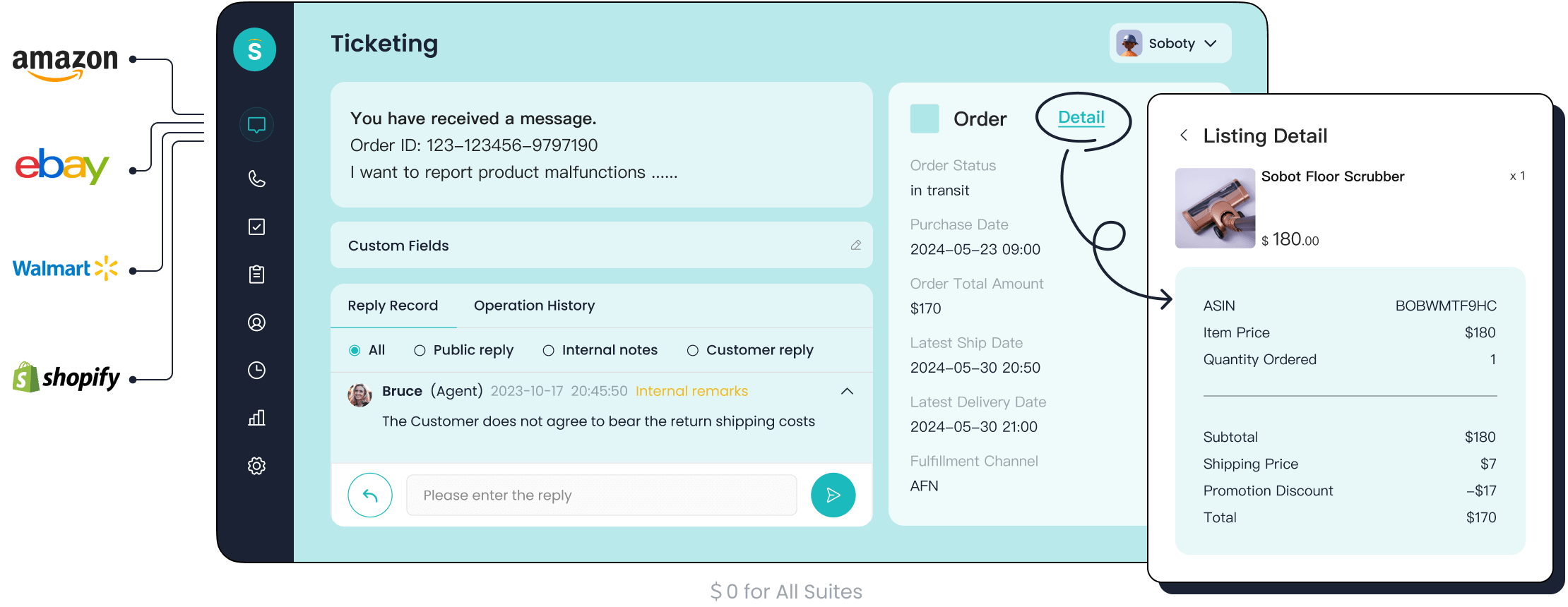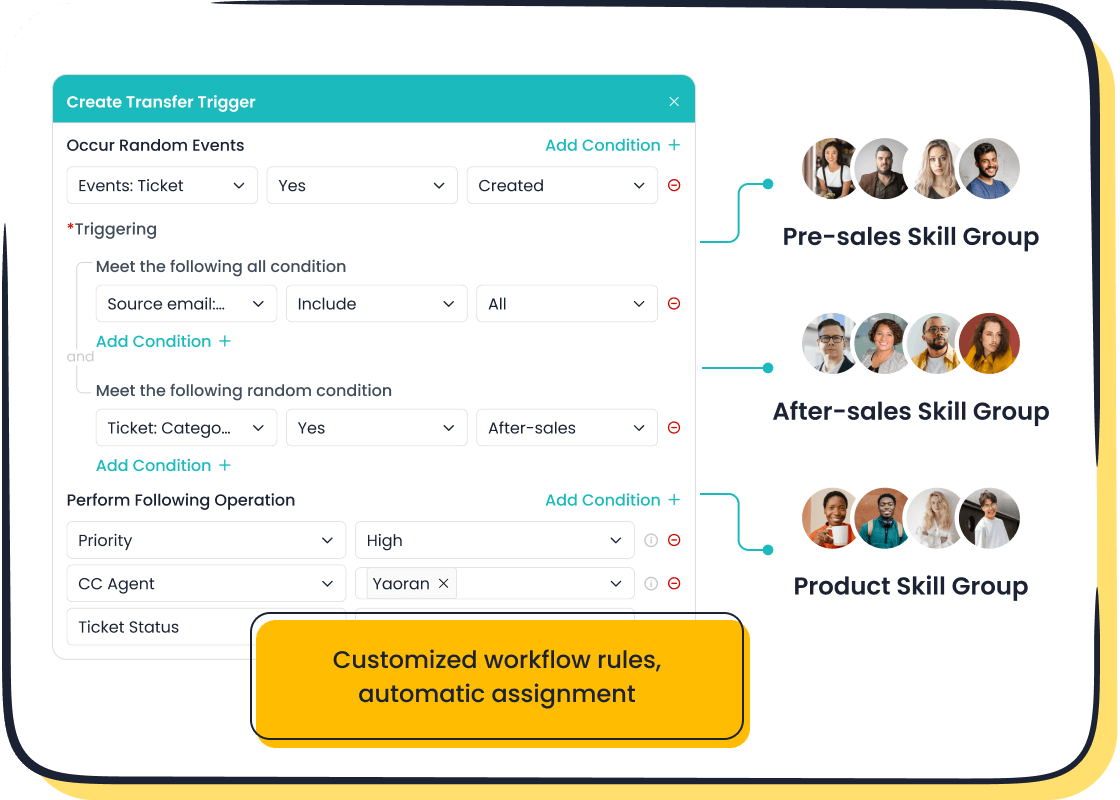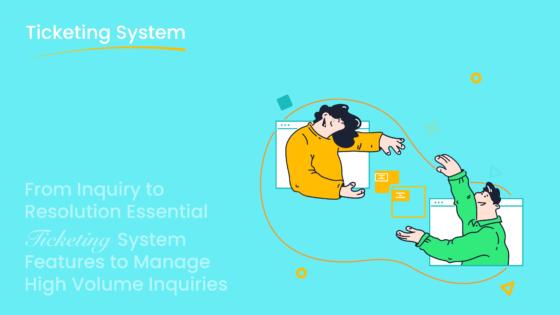How AI Ticketing Systems Challenge Old Methods

Generative AI is transforming customer service by making processes faster, smarter, and more efficient. Unlike traditional systems, which often rely on manual workflows, generative AI streamlines operations through automation. For example, it automates responses to repetitive queries, reducing response times and ensuring consistency. Businesses report productivity gains of up to 50%, with customer satisfaction increasing by 18% in some cases.
AI ticketing systems, like the one offered by Sobot, take this innovation further. They unify communication channels, automate ticket routing, and leverage intelligent tools for accurate issue resolution. Companies using generative AI in customer service have seen a 32% revenue increase, highlighting its potential to enhance user experience and operational efficiency.
Traditional methods struggle with scalability and speed, often leading to slower issue resolution. Generative AI addresses these challenges by enabling faster responses, improving accuracy, and supporting multilingual interactions.
What Are AI Ticketing Systems?
Defining Generative AI in Ticketing
Generative AI in ticketing refers to the use of advanced artificial intelligence to automate and enhance customer service processes. It uses machine learning models to understand customer queries, generate accurate responses, and predict future needs. Unlike traditional systems, which rely on predefined rules, generative AI learns from data to improve over time. This makes it highly adaptable and efficient.
For example, when a customer submits a query, generative AI can analyze the message, identify the issue, and provide a solution instantly. It can even handle complex tasks like translating messages into different languages or predicting the urgency of a ticket. This technology ensures faster response times and a more personalized experience for users.
Core Functionalities of AI Ticketing Systems
AI ticketing systems come with a range of functionalities designed to streamline customer support. These systems not only automate repetitive tasks but also provide valuable insights to improve decision-making. Below is a table summarizing some core functionalities and how they can be measured:
| Functionality | Quantitative Measurement |
|---|---|
| Sales Qualified Leads (SQLs) | Tracking and scoring leads for follow-ups |
| Revenue Impact | Analyzing Gross Revenue and Cost-to-Revenue Ratios |
| AI Predictions | Predicting conversion likelihood based on behavior |
| Session Attendance | Tracking metrics like attendance and engagement levels |
| Engagement Metrics | Assessing participation in Q&As, polls, and chats |
| Cost-to-Revenue Ratio (CTR) | Evaluating profitability and optimizing budgets |
These functionalities enable businesses to track performance, optimize resources, and enhance customer satisfaction. For instance, AI predictions can help prioritize tickets based on their likelihood of conversion, ensuring that high-value customers receive prompt attention.

How Sobot's Ticketing System Leverages Generative AI
Sobot's ticketing system exemplifies how generative AI can transform customer service. It integrates multiple communication channels, such as email, voicemail, and chat, into a unified platform. This ensures that all customer interactions are managed efficiently. The system uses AI to automate ticket creation, routing, and resolution, significantly reducing manual effort.
One standout feature is its ability to set custom trigger rules. These rules automatically assign tickets to the right agents based on criteria like urgency or customer type. Additionally, Sobot's system supports multilingual interactions, making it ideal for global businesses. Its SLA management feature ensures that response and resolution times meet predefined standards, enhancing reliability.
Sobot also provides comprehensive analytics to monitor performance. For example, businesses can track metrics like ticket resolution rates and customer satisfaction scores. These insights help identify areas for improvement, ensuring continuous optimization. With its robust features, Sobot's ticketing system not only improves efficiency but also enhances the overall customer experience.
Key Advantages of AI Ticketing Systems

Automating Customer Service for Faster Response Times
AI ticketing systems revolutionize customer service by automating repetitive tasks and delivering instant responses. Unlike traditional methods, which often require hours for a first reply, AI systems categorize tickets accurately and prioritize them based on urgency. This automation reduces the mean time to resolution (MTTR) from hours to seconds, ensuring faster issue handling.
For example, AI-powered ticketing systems can automatically resolve routine inquiries, such as password resets or order tracking, without human intervention. This allows your support team to focus on complex, high-value issues. Faster response times not only enhance customer satisfaction but also improve operational efficiency.
A case study revealed that implementing an AI assistant reduced response times by 30%, significantly boosting customer experience.
Sobot's ticketing system exemplifies this efficiency. It uses generative AI to automate ticket routing and resolution, ensuring immediate responses and consistent service quality. With features like SLA management and smart notifications, you can meet predefined response standards effortlessly.
Enhanced Personalization and User Experience
Personalization is key to delivering exceptional customer experiences. AI ticketing systems harness data from browsing history, purchase patterns, and social media interactions to tailor responses. This creates a more empathetic connection with customers, moving beyond generic replies.
For instance, 71% of consumers expect personalized interactions, and 76% feel frustrated when companies fail to deliver them. AI tools address this by learning from historical data and adapting responses to individual preferences. They can even predict customer needs, offering proactive solutions before issues arise.
Sobot's ticketing system leverages generative AI to provide personalized messaging. It integrates customer data into a unified platform, displaying all relevant information next to each ticket. This ensures that every interaction feels tailored and meaningful, enhancing user satisfaction.
"AI enables personalized messaging that creates an empathetic connection with customers, rather than offering stock responses."
Scalability and Cost Efficiency
Traditional ticketing systems struggle to scale during peak times, requiring additional staff to handle increased ticket volumes. AI ticketing systems, however, operate 24/7 and manage inquiries simultaneously, making them ideal for global businesses with diverse customer bases.
Automation reduces operational costs by eliminating the need for extra personnel during high-demand periods. AI systems also ensure consistent service quality, minimizing human errors and improving efficiency.
| Aspect | Manual Ticketing | AI Automated Ticketing |
|---|---|---|
| Average resolution time | A few hours to days | Minutes to a few hours |
| First response time | Hours | Immediate |
| Support team workload | High volume of repetitive tasks | Focus on complex, high-value issues |
| Consistency | Dependent on agent availability and knowledge | Consistent experience for all users |
| Scalability | Requires adding staff as ticket volume grows | Can handle increasing volume with minimal additional resources |
Sobot's ticketing system exemplifies scalability and cost efficiency. Its multilingual support and automated workflows allow businesses to handle increasing ticket volumes without additional resources. By integrating communication channels like email, voicemail, and chat, Sobot ensures seamless operations and reduced costs.
Improved Accuracy with AI-Driven Insights
AI ticketing systems excel at delivering precise and actionable insights, enabling you to make better decisions and improve customer service outcomes. By analyzing vast amounts of data in real time, these systems identify patterns, predict trends, and provide recommendations that traditional methods cannot match. This level of accuracy ensures that your team focuses on the right priorities, reducing errors and enhancing overall efficiency.
One of the most significant benefits of AI-driven insights is faster decision-making. For instance, businesses using AI tools report saving up to 18 hours per project during a two-week sprint. These systems also improve team alignment by reducing the need for 26 meetings each month, allowing your team to spend 43% more time on revenue-generating tasks. The financial impact is equally impressive, with annual cost savings of $21,000 per person.
| Benefit | Impact | Timeframe |
|---|---|---|
| Faster Decision-Making | Saves 18 hours per project | 2-week sprint |
| Better Team Alignment | Reduces 26 meetings | Monthly |
| Increased Productivity | 43% more time on revenue tasks | Ongoing |
| Cost Savings | $21,000 saved per person | Annually |
AI insights also enhance operational accuracy by predicting and preventing potential issues. For example, companies have achieved a 35% improvement in safety incident prediction and prevention, along with an 18% decrease in cost overruns. These predictive capabilities ensure that your business stays ahead of challenges, minimizing disruptions and maximizing efficiency.
Sobot's ticketing system leverages AI to deliver these benefits seamlessly. It uses advanced analytics to monitor ticket resolution rates, identify bottlenecks, and suggest improvements. The system’s automation capabilities ensure that tickets are categorized and routed with precision, reducing human error. Additionally, its multilingual support and SLA management features further enhance accuracy, making it an ideal solution for businesses with global operations.
By adopting AI-driven ticketing systems, you can achieve measurable improvements in productivity and accuracy. For example, businesses have reported a 30% increase in team productivity and a 25% reduction in time spent on administrative tasks. These gains translate into better customer experiences and more efficient operations.
Tip: Use AI insights to prioritize high-value tickets and allocate resources effectively. This approach not only improves accuracy but also boosts customer satisfaction.
Real-World Applications of AI in Ticketing

AI in Event Ticketing and Dynamic Pricing
AI has revolutionized event ticketing by introducing dynamic pricing models. These systems adjust ticket prices in real time based on demand, ensuring optimal revenue generation. Machine learning algorithms analyze historical sales data, predict demand patterns, and set prices accordingly. This process involves continuous adjustments to reflect market conditions.
- AI-powered dynamic pricing ensures fair ticket distribution during high-demand events.
- Algorithms process large datasets to estimate demand functions and optimize pricing strategies.
- Event organizers benefit from increased revenue while customers enjoy transparent pricing.
For example, a concert venue using AI-based pricing can maximize ticket sales by offering discounts during low-demand periods and premium pricing for high-demand seats. This approach not only boosts revenue but also enhances customer satisfaction by providing flexible options.
Travel and Transportation Ticketing Solutions
AI has transformed ticketing in the travel and transportation sectors, making processes more efficient and customer-focused. According to a Gartner report, 80% of customer service organizations will adopt generative AI by 2025 to improve agent efficiency. In the hospitality industry, 78% of businesses already use AI-powered voice assistants to provide real-time support.
AI systems streamline ticket booking by offering personalized recommendations based on user preferences. For instance, a leading hospitality company used AI to suggest activities tailored to guests’ interests, significantly improving satisfaction. Additionally, AI-driven ticketing platforms reduce wait times and ensure seamless travel experiences.
The global impact of AI in this sector is immense, with predictions of contributing $19.9 trillion to the economy. These advancements highlight the importance of adopting AI solutions to meet evolving customer expectations.
Sobot's Role in Customer Support and Issue Resolution
Sobot’s AI-powered ticketing system plays a pivotal role in enhancing customer support and resolving issues efficiently. By leveraging advanced analytics and automation, Sobot ensures faster ticket resolution and improved customer satisfaction.
| Metric | Improvement Description |
|---|---|
| First-Call Resolution (FCR) | Enhanced by AI-driven tools, leading to quicker resolutions on first contact. |
| Average Handle Time (AHT) | Reduced through AI analytics that streamline agent workflows and data access. |
| Customer Satisfaction Scores | Increased due to more effective issue resolution and support interactions. |
| Repeat Calls | Decreased by 50% through proactive root cause resolution by AI systems. |
| Net Promoter Scores (NPS) | Reported to be 15% higher in call centers utilizing AI tools compared to those that do not. |
Sobot’s system integrates communication channels like email, voicemail, and chat into a unified platform. This approach simplifies support ticket management and ensures real-time support for customers. With features like SLA management and multilingual capabilities, Sobot empowers businesses to deliver exceptional service globally.
AI in Call Centers and Service Desks
AI has transformed call centers and service desks, making them more efficient and customer-focused. By automating repetitive tasks, AI systems allow agents to concentrate on complex issues, improving overall service quality. You can rely on AI-powered tools to transcribe customer conversations, analyze pain points, and refine training programs. These insights help your team deliver better support and enhance customer satisfaction.
AI systems provide several benefits that traditional methods cannot match. For example:
- Automated ticket routing ensures tickets reach the right department instantly.
- Consistent responses minimize human errors, creating a reliable customer experience.
- Cost savings reduce the need for large support teams, making operations more efficient.
| Benefit | Description |
|---|---|
| 24/7 availability | AI systems provide support at any time, enhancing customer access. |
| Faster response times | Instant acknowledgment and categorization of tickets for quick resolutions. |
| Improved efficiency | Automation of repetitive tasks reduces manual workload and increases output. |
Sobot’s AI-powered ticketing system exemplifies these advantages. It integrates communication channels like email, voicemail, and chat into a unified platform, ensuring seamless operations. Its automated support features categorize tickets and route them to the right agents, reducing response times and improving accuracy. With tools like SLA management and multilingual capabilities, Sobot empowers you to deliver exceptional service globally.
Case studies highlight the impact of AI in call centers. One call center used AI-driven analytics to personalize service offerings, boosting customer retention. Another reduced repeat calls by 50% through proactive issue resolution. These examples demonstrate how AI enhances efficiency and builds customer loyalty.
By adopting AI ticketing systems, you can achieve faster resolutions, lower costs, and higher satisfaction rates. The technology ensures your team stays focused on delivering value while AI handles routine tasks.
Challenges and Limitations of AI Ticketing Systems
Ethical Concerns and Data Privacy
AI ticketing systems rely heavily on customer data to function effectively. This raises concerns about how businesses handle sensitive information. You must ensure that your AI system complies with ethical guidelines and data privacy standards to maintain trust. Key frameworks like ISO/IEC 42001 and the NIST AI Risk Management Framework provide essential guidance. These frameworks emphasize transparency, bias control, and robust privacy protections.
For example, ISO/IEC 42001 focuses on AI governance, including risk management and ethical considerations. Similarly, the NIST framework helps organizations identify and mitigate risks associated with AI systems. Adopting these standards ensures your system operates ethically and securely.
Customers often share personal details when submitting customer queries. If your system lacks proper safeguards, this data could be exposed to unauthorized access. By implementing encryption and regular audits, you can protect customer feedback and maintain compliance with regulations like GDPR.
Tip: Always prioritize transparency in how your AI system collects and uses data. This builds trust and reduces privacy concerns.
Dependence on Quality of Training Data
The effectiveness of AI ticketing systems depends on the quality of their training data. Poorly curated data can lead to inaccurate responses, frustrating users. For instance, if your system learns from biased or incomplete data, it may fail to address customer queries effectively.
You need to invest in high-quality, diverse datasets to train your AI system. This ensures it can handle a wide range of scenarios and provide accurate solutions. Regular updates to the training data are also crucial. As customer needs evolve, your system must adapt to meet new challenges.
Sobot’s ticketing system addresses this limitation by leveraging advanced analytics to refine its AI models. It continuously learns from customer feedback, improving its accuracy over time. This approach ensures your system remains reliable and effective.
Resistance to Change in Traditional Industries
Traditional industries often resist adopting AI ticketing systems. Employees may fear job losses as automation replaces manual tasks. This resistance can slow down the transition to more efficient systems.
You can overcome this challenge by focusing on education and training. Help your team understand how AI enhances their roles rather than replacing them. For example, AI can handle repetitive tasks, allowing employees to focus on complex issues that require human expertise.
Misinformation about AI also contributes to resistance. Some believe AI systems are prone to errors or lack reliability. By sharing success stories and demonstrating the benefits of AI, you can address these misconceptions. For instance, Sobot’s AI-powered ticketing system has helped businesses improve customer satisfaction and streamline operations, proving its value in real-world applications.
Note: Change management strategies, including workshops and open communication, can ease the transition to AI systems.
Future of AI in Ticketing Systems
Trends in AI-Driven Ticketing Systems
AI ticketing systems are evolving rapidly, reshaping how businesses manage customer interactions. You can expect dynamic pricing to become a cornerstone of ticketing strategies. This approach adjusts prices in real time based on demand and search trends, ensuring optimal revenue generation. For example, platforms like Ticketmaster use AI tools such as "Platinum Tickets" to maximize revenue while filling venues effectively. However, challenges like customer dissatisfaction due to price fluctuations remain a hurdle.
In IT service desks, AI-powered conversational ticketing systems are gaining traction. A recent survey revealed that 63% of IT professionals believe these systems can enhance operations significantly. By automating ticket routing and resolution, AI reduces manual effort and improves efficiency. These trends highlight the growing reliance on generative ai to streamline processes and deliver faster, more accurate responses.
Innovations in Personalization and Predictive Analytics
AI is revolutionizing how businesses deliver personalized customer experiences. Predictive analytics, powered by generative ai, enables you to anticipate customer needs and tailor interactions accordingly. According to VentureBeat, 84% of companies already use AI-driven predictive analytics to boost their marketing efforts. These tools analyze large datasets to identify patterns and trends, leading to more accurate predictions.
For instance, in retail, AI forecasts demand by examining past sales data, weather patterns, and social media trends. This helps businesses optimize inventory and marketing strategies. AI also allows retailers to create unique campaigns based on individual preferences, enhancing customer engagement. Sobot’s AI solutions integrate predictive analytics to help businesses deliver personalized customer experiences, ensuring every interaction feels meaningful and relevant.
Integration with Emerging Technologies
The future of AI ticketing systems lies in their ability to integrate with emerging technologies. By combining AI with tools like IoT and blockchain, you can achieve faster response times and improved accuracy. Studies show that 60% of customers expect replies within an hour, emphasizing the need for speed. AI-driven systems reduce resolution times by up to 93%, significantly enhancing customer satisfaction.
| Evidence Type | Description |
|---|---|
| Customer Expectations | 60% of customers want a reply within the hour, highlighting the need for faster response times. |
| Resolution Time Improvement | AI-driven systems can reduce resolution times by 93%, significantly enhancing customer satisfaction. |
| Profit Increase from Retention | A 5% increase in customer retention can boost profits by 25-95%, showcasing the financial impact of improved customer service. |
| Operational Cost Reduction | AI efficiencies can cut operational costs by up to 50%, allowing for scalability without additional hiring. |
| Case Study: Uber Freight | Reduced email response times by 50% and cut ticket volumes by 4% year-on-year with AI implementation. |
| Case Study: Boostability | Slashed response times from 10 hours to just 4 hours through automated email assignments. |
Sobot’s ticketing system exemplifies this integration. It combines AI with advanced analytics to deliver faster resolutions and actionable insights. By adopting these technologies, you can reduce costs, improve efficiency, and stay ahead in a competitive market.
Sobot's Vision for the Future of Customer Support
Sobot envisions a future where customer support becomes faster, smarter, and more personalized. By leveraging cutting-edge technologies like generative AI, predictive analytics, and real-time data processing, Sobot aims to redefine how you interact with customers. The goal is to create seamless experiences that anticipate needs and resolve issues before they escalate.
One of Sobot's key priorities is integrating AI with emerging technologies such as IoT and blockchain. For example, IoT devices can provide real-time updates about product performance, allowing your support team to address potential issues proactively. Blockchain ensures secure and transparent data sharing, which builds trust with your customers. These innovations will make customer support more efficient and reliable.
Sobot also focuses on enhancing personalization. Its AI-driven ticketing system already uses customer data to tailor responses. In the future, Sobot plans to expand this capability by incorporating advanced sentiment analysis. This will help you understand customer emotions and respond with greater empathy. Studies show that 86% of customers are willing to pay more for better experiences, making personalization a critical factor for success.
Sobot’s vision includes empowering your team with AI copilots. These tools assist agents by summarizing conversations, suggesting solutions, and automating repetitive tasks. This allows your team to focus on complex issues, improving both efficiency and satisfaction. With Sobot, the future of customer support is not just about solving problems—it’s about building lasting relationships.
Tip: Stay ahead by adopting AI-powered tools like Sobot’s ticketing system. It ensures your customer support evolves with changing expectations.
Generative AI has revolutionized ticketing systems by addressing inefficiencies that traditional methods could not overcome. Automation now populates ticket details, generates summaries, and adjusts response tones to meet customer expectations. These advancements save time, improve satisfaction, and broaden accessibility through multilingual support.
| Metric | Description |
|---|---|
| Automation of ticket information | Automatically populates key ticket details from customer interactions, saving time for agents. |
| Enhanced response generation | Generates high-level overviews from conversations, providing context quickly. |
| Tone modification | Adjusts the tone of responses to match customer expectations, improving satisfaction. |
| Multilingual support | Offers support in multiple languages, broadening accessibility for diverse customer bases. |
| Summarization of conversations | Summarizes lengthy interactions, allowing agents to focus on critical issues. |
| Adjusted performance metrics | Suggests new metrics like 'bot first response time' to accurately reflect AI's role in support. |
Sobot's Ticketing System exemplifies these innovations. It unifies communication channels, automates workflows, and provides multilingual capabilities, making it a powerful tool for customer support. By adopting AI-driven solutions, you can enhance customer service, reduce costs, and stay competitive in a rapidly evolving market.
Tip: Businesses that embrace AI ticketing systems often see measurable improvements in efficiency and customer satisfaction, ensuring long-term success.
FAQ
What is an AI ticketing system?
An AI ticketing system automates customer support tasks like ticket creation, routing, and resolution. It uses generative AI to analyze queries, predict urgency, and provide instant responses. Sobot’s system integrates multiple channels, ensuring seamless communication and faster resolutions. Learn more here.
How does Sobot’s ticketing system improve efficiency?
Sobot’s system automates workflows, reducing manual effort. Features like SLA management and custom triggers ensure tickets reach the right agents quickly. Multilingual support and analytics enhance accuracy, making operations smoother and more efficient.
Can AI ticketing systems handle multilingual queries?
Yes, AI ticketing systems like Sobot’s support multiple languages. They translate queries instantly, ensuring global customers receive accurate responses. This feature improves accessibility and customer satisfaction.
Are AI ticketing systems secure?
AI ticketing systems prioritize security. Sobot’s platform uses encryption and GDPR compliance to protect customer data. Regular audits ensure privacy and reliability, building trust with users.
How do AI-driven insights benefit businesses?
AI insights analyze data to identify trends and predict issues. Sobot’s system provides actionable recommendations, helping you optimize operations and improve customer satisfaction. Businesses report up to 30% productivity gains with AI-driven tools.
See Also
Exploring AI Solutions for Modern Call Center Operations
Transforming Customer Support with AI Service Agents
Enhancing Operational Efficiency with AI Customer Software
